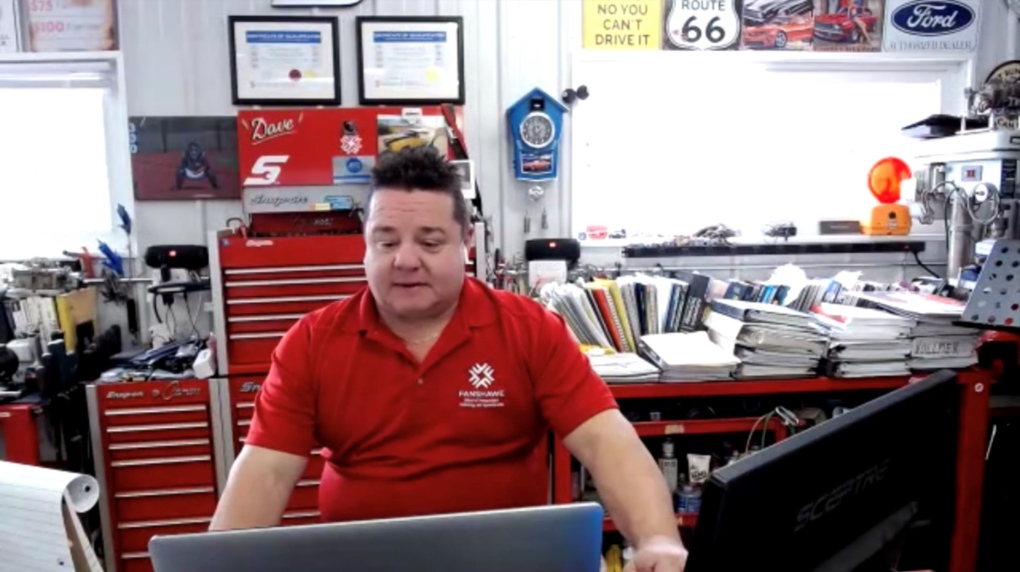The finish line draws closer for gas powered vehicles at Ontario CAMI plant
After more than three decades of production, it’s getting closer to the end of the line for the last fossil fuel-dependent vehicles at GM’s Ingersoll, Ont. CAMI Assembly Plant.
The last Chevy Equinox to be built at the plant is scheduled to roll off the assembly line on April 29, according to UNIFOR Local 88.
“We’re actually on six days a week right now, trying to build every last Equinox we can before April 29,” said Local 88 Chair Mike Van Boekel.
At the back of the CAMI plant, and close to the truck entrance a small number of BrightDrop EV delivery vans could be seen parked on Thursday. They were actually assembled by Ingersoll CAMI workers at a GM site in Michigan as ‘trial builds’ according to Van Boekel.
The Brightdrop EV is the vehicle headed to the CAMI plant for production. Van Boekel said as of May 1, the plant will shut down and retool. Unifor Local 88 Chair Mike Van Boekel, March 3, 2022/ (Bryan Bicknell / CTV News)CAMI will be reborn in October or November as Canada’s first EV assembly plant.
Unifor Local 88 Chair Mike Van Boekel, March 3, 2022/ (Bryan Bicknell / CTV News)CAMI will be reborn in October or November as Canada’s first EV assembly plant.
“It’s a lot of mixed emotion,” said Van Boekel. “We have a lot of people that have been here almost since the beginning watching the plant go through different stages. And there is the bad news of course that we’re going to be home from May first to the fall on EI. We do have a supplemental income, but it’s going to be tough, especially on young families if they’re both working in there.” He said the skilled trades workers will stay on during the plant retooling.
By the time the last gas-powered vehicle rolls off the line, several hundred employees will have been at the plant for 30 plus years.
Van Boekel said that’s significant because with retirements and attrition, the union is not expecting any job losses.
Fanshawe College automotive professor Dave Vollmer said the timing of the move from gas to electric production is key to the plant’s survival. Automotive Instructor at Fanshawe College, Dave Vollmer, Marc 3, 2022. (Bryan Bicknell / CTV News)“Whatever the manufacturer is, I think they’re all concerned about the environment and I think that’s kind of the buzzword today,” said Vollmer. “More of the people are becoming more socially connected to the environment and they’re pushing for it as well. The technology has probably reached a point where it can suffice and satisfy the needs of the driver, the builder of the vehicle.”
Automotive Instructor at Fanshawe College, Dave Vollmer, Marc 3, 2022. (Bryan Bicknell / CTV News)“Whatever the manufacturer is, I think they’re all concerned about the environment and I think that’s kind of the buzzword today,” said Vollmer. “More of the people are becoming more socially connected to the environment and they’re pushing for it as well. The technology has probably reached a point where it can suffice and satisfy the needs of the driver, the builder of the vehicle.”
According to UNIFOR, CAMI already has three years worth of production lined up building EV delivery vans for FedEx, and Walmart also recently inked a deal to have the plant build its vans for home delivery.
“And it’s the kind of vehicle we’re finding out where people aren’t coming in to buy one or two, although I think it may get there at some point,” said Van Boekel. “But right now our customers are ordering 10,000, 5,000, 15,000 units at a time.”
Van Boekel said he expects between 1,500 and 1,700 hundred people to be working at the plant by some time in 2023.
CTVNews.ca Top Stories

Trudeau noncommittal on expanding rebate beyond 'working Canadians'
Prime Minister Justin Trudeau does not appear willing to budge on his plan to send a $250 rebate to 'hardworking Canadians,' despite pressure from the opposition to give the money to seniors and people who are not able to work.
'Mayday!': New details emerge after Boeing plane makes emergency landing at Mirabel airport
New details suggest that there were communication issues between the pilots of a charter flight and the control tower at Montreal's Mirabel airport when a Boeing 737 made an emergency landing on Wednesday.
Cucumbers sold in Ontario, other provinces recalled over possible salmonella contamination
A U.S. company is recalling cucumbers sold in Ontario and other Canadian provinces due to possible salmonella contamination.
Latest updates: Tracking RSV, influenza, COVID-19 in Canada
As the country heads into the worst time of year for respiratory infections, the Canadian respiratory virus surveillance report tracks how prevalent certain viruses are each week and how the trends are changing week to week.
Weekend weather: Parts of Canada could see up to 50 centimetres of snow, wind chills of -40
Winter is less than a month away, but parts of Canada are already projected to see winter-like weather.
W5 Investigates A 'ticking time bomb': Inside Syria's toughest prison holding accused high-ranking ISIS members
In the last of a three-part investigation, W5's Avery Haines was given rare access to a Syrian prison, where thousands of accused high-ranking ISIS members are being held.
Federal government posts $13B deficit in first half of the fiscal year
The Finance Department says the federal deficit was $13 billion between April and September.
Armed men in speedboats make off with women and children when a migrants' dinghy deflates off Libya
Armed men in two speedboats took off with women and children after a rubber dinghy carrying some 112 migrants seeking to cross the Mediterranean Sea started deflating off Libya's coast, a humanitarian aid group said Friday.
Nick Cannon says he's seeking help for narcissistic personality disorder
Nick Cannon has spoken out about his recent diagnosis of narcissistic personality disorder, saying 'I need help.'


































